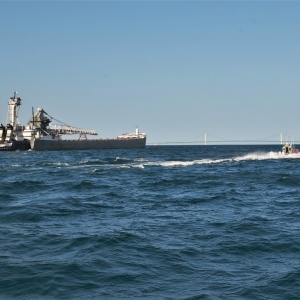The Stream, October 2, 2020: PFAS Compounds Are Developed Faster Than Regulators Can Track Them
The Global Rundown
Scientists and regulators find it difficult to track and regulate new PFAS compounds in the United States, according to researchers. A quarter of Nigeria’s projected rice harvest has been lost due to flooding. Brazil’s Pantanal wetlands continue to burn without much intervention from the government. Appellate court judges reverse a decision about indigenous rights to the Jemez River in New Mexico. Some indigenous communities in Canada have been without water for decades.
“It should not take that long to solve some of these things and improve people’s lives on reserve and in communities when [the government] can do much, much more for regular Canadians at the drop of a hat when something like Covid-19 hits.” – Rob Houle, an indigenous advocate from Swan River First Nation. The Canadian government has said they are no longer comfortable with the target date they set to bring safe water to all Indigenous reserves by March of 2021 because of the coronavirus pandemic. Covid-19 has been particularly devastating in Indigenous communities around the world because of a lack of infrastructure that has led to decrepit living conditions and lack of access to clean water and health care. At the end of last month, there were 63 reserves in Canada with long-term drinking water advisories in place. CBC
Latest WaterNews from Circle of Blue
Explainer: Who regulates U.S. drinking water, and how? – Federal, state and local governments all have a hand in protecting public water systems and private wells from contamination. This story was co-published with Ensia, a solutions-focused nonprofit media outlet reporting on our changing planet.
By The Numbers
2 million The number of tons of rice that has been lost in northern Nigeria due to flooding. Nigeria annually imports billions of dollars of rice and wheat, but last year the government banned land-based rice imports in hopes of becoming self-sufficient. Despite the enormous losses, which account for a quarter of Nigeria’s projected harvest, officials say the ban will remain in place. Nigeria’s farmers association is calling for better flood prevention methods and a steady water supply during the dry season to avoid future losses. Voice of America
84 percent The percentage of vegetation destroyed from wildfires in Brazil’s Encontro das Aguas state park. The country’s Pantanal wetlands have been exceptionally dry and have burned at record rates this year. Dozens of firefighters, ranchers, tour guides and veterinarians told the Associated Press that the Brazilian government has exaggerated its response to the fires, despite claims they have mobilized hundreds of federal agents to quench the flames. Last month, Brazil’s government approved 13.9 million reais (about $2.5 million) to fight the fires, but most of the funding is contingent on the Brazilian state of Mato Grasso getting approval for projects within a 90-day deadline. AP
Science, Studies, and Reports
It’s difficult to track and regulate new compounds of PFAS, a group of more than 5,000 chemicals, according to state and federal researchers. Earlier this summer, a report found one of these new chemicals in multiple soil tests across New Jersey. The report named a Solvay Specialty Polymers USA plant as the likely source of the contamination. Although Solvay has denied responsibility, the company has a long history of PFAS contamination. Documents obtained by Consumer Reports show Solvay recently developing and using a new PFAS compound without implementing an official way for regulators to analyze its environmental impact. PFAS is one of several “forever chemicals” that can live in the environment and in the human body without breaking down over time. The chemicals can be found in drinking water in systems near manufacturers, landfills, wastewater treatment plants or firefighter training facilities. Consumer Reports
On the Radar
A panel of federal appellate judges reversed a lower court ruling in a decades-long battle over the Jemez River. The panel found that when Spain took control of what is now the American Southwest centuries ago, they did not extinguish the aboriginal water rights of Jemez, Zia and Santa Ana pueblos. In a dissenting opinion, Judge Timothy M. Tymkovich wrote that the ruling does not mean the pueblos now have infinite water rights, pointing to an 1848 treaty with the U.S. government that recognized the pueblos’ right to water was limited to only what was used. AP
Jane is a Communications Associate for Circle of Blue. She writes The Stream and has covered domestic and international water issues for Circle of Blue. She is a recent graduate of Grand Valley State University, where she studied Multimedia Journalism and Women, Gender and Sexuality Studies. During her time at Grand Valley, she was the host of the Community Service Learning Center podcast Be the Change. Currently based in Grand Rapids, Michigan, Jane enjoys listening to music, reading and spending time outdoors.






Leave a Reply
Want to join the discussion?Feel free to contribute!